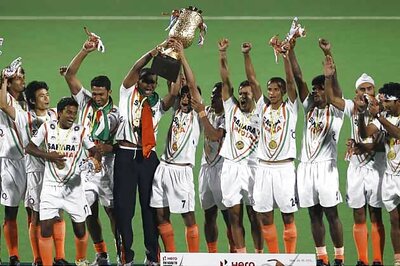
views
The Law Commission is asking the people of India to give their opinion on the implementation of a Uniform Civil Code in the country. The Commission plans to release a questionnaire that anybody can fill out and send back within 45 days. The referendum of sorts could ruffle the feathers of many religious groups.
Law Commission Chairman Justice Balbir Singh Chauhan talks to News18.com’s Debayan Roy on the application of personal law in India and other issues surrounding the judiciary.
With a lot of debate revolving around the Uniform Civil Code, is there any deliberation over this issue. Reports suggested that the Commission is relying on the Portuguese Civil Code...
No, we have not taken the Portuguese Civil Code in consideration in particular. We are just studying it and we have collected vast material. Muslim personal law needs special attention. We are studying what triple talaq is, what the law governing inheritance is among other issues. Even in Pakistan and Bangladesh, they do not permit more than one wife. Hence, we are at a very preliminary stage.
Now, we have to make a questionnaire and put it up on our website. Whoever wants to reply can do so. The questionnaire will take into consideration all the complaints and suggestions received by us. It will be translated into regional languages. Many people have approached us on this issue. I keep getting postcards every day stating that it is a bad idea and must be scrapped. The questionnaire will give us a perspective on how people react.
But do you think Muslim women have most of their fundamental rights violated on the pretext of the application of the personal law?
The court has held that it does not. After the Shah Bano judgment, The Muslim Women (Protection of Rights on Divorce) Act 1986 came into force. Then it was stated that the Act does not violate any fundamental right. But now, I see a change with so many educated women coming forth. Hence, we are basing our future course of action on the response to the questionnaire. Many mullahs have come to us and discussed these issues as well. They have expressed their objections and we have heard them out. We are even discussing their apprehensions with our legal experts.
There are some serious problems brewing within the Supreme Court collegium and the stalemate between the Chief Justice of India and Justice Chelameswar persists. Is there any end to this conflict?
The issue has been wrongly presented as a case of appointing more judges. The real problem lies elsewhere. We need to fill up the existing vacancies, and this starts at the lower levels. Recently, there were 80 vacancies at the Delhi High Court. Out of that, only 12 could be filled. Rest of the judges could not be appointed and this is because there is a difference between ‘eligible’ and ‘suitable’ candidates. You are eligible because you have been practising for years, but I interview you and find that you are not suitable. This may happen even after you clear the written tests. Everybody blames the ‘system’ but nobody blames our legal education system, which is unable to churn out suitable candidates. I agree that there is a huge pendency of cases, but if there are no proper persons to fill those positions, how do we solve the problem? What purpose will expanding the recruitment drive serve? Let’s say the existing vacancies are 5,000. If you enhance the strength to a thousand more, how will you fill them up?
Is there an alternative to this chaos?
Comparatively, Delhi and Mumbai have the best lawyers. If we are unable to fill vacancies in these cities, how do we fill them up at other high courts? We cannot ask an unsuitable person to sit in court and pronounce a death penalty. Nobody knows that we don’t get suitable candidates from the huge pool of those available. Hence, enhancing the strength of the judiciary will serve no purpose until the existing vacancies are filled up. We have been the part of the profession, so we know where the thorn pinches.
There has been severe criticism in the media recently of the 21st Law Commission headed by you for not coming out with any reports, whereas the one headed by your predecessor, Justice AP Shah, presented 19 reports in two years. Why the delay?
We have submitted reports, but we do not advertise the fact. People who have written us off saying we do not come up with reports only seem to be addressing personal grievances against me, because, honestly, I was a very unpopular judge. We are doing our work, but we don’t want to give the report half-heartedly. We file notices, we hear the people out and then make our own observations. There have been reports that have questioned the Commission’s credibility by calling it a ‘Low Commission’. The author has gone to the extent of stating that, as a judge, Justice Chauhan used to cite so many laws, precedents, and areas where reforms were needed, but while chairing the Commission, has not delivered any reports. Do you think we should present half-baked reports? Every agency is to be heard and consulted before drafting a legislation. Some agencies request an extension of a few weeks, and we have to give them the extension.
I was a party to the Bombay blast case and that was the biggest case the country ever faced. The file ran into 90,000 cases. We poured 10 months into it. There were 48 appeals against the order, where all those convicted had appealed. So we had to compile all the data and deal with it. So you see, we do not want to advertise the work we do. It’s not required. Should we publish something just for the sake of the public or advertisement? Once it’s ready, it will be presented to the government.
What is the status of the legislation on the issue of parental abduction?
Punjab and Haryana had asked us to look into the issue of parental abduction. We are in the final stages of drafting the legislation and we should release the report anytime now. The issue is a very sensitive one. Suppose the parents are separated and the child’s custody has been given to the father. But the mother runs away with the child, violating the court order. What should be done especially when there is no law to handle this. We consulted a lot of lawyers and subject matter experts. A similar case was decided by me, where the mother who abducted the child was in a remote Tamil Nadu village for almost four years. This child was later sent to the father, but the four years the child lost on education and nutrition was irreparable.
After the Bihar High Court struck down the state’s Liquor Prohibition Act, Nitish Kumar echoed sentiments of bringing in another legislation imposing a liquor ban. Is it defiance of the court’s verdict?
Absolutely not. The High Court struck down that piece of legislation because certain provisions were ultra-vires the Constitution. Now, if the Nitish Kumar government can remove these unconstitutional provisions and bring in a new law, then it may be acceptable. Let me tell you from my own experience, many people challenge a particular law, but when the court hears it, the state comes to know of all the problems. If the state removes all these defects, then a new legislation can be presented to the public. The court never bars you from bringing a new piece of legislation. However, the vicious circle continues even with the new Act being challenged in the court.
There have been murmurs in the civil society that the Law Commission must delve into the menace of honour killing. Do you think a legislation on this is the need of the hour?
Here is the point where knowledge among the public plays a crucial role. First, let me clarify, we do not need any specific legislation to deal with honour killing. It is essentially murder with a motive, and hence is liable to be prosecuted under Section 302 (Murder) of the Indian Penal Code. People have to be educated about this issue. Before the Hindu Marriage Act, 1955, sagotra vivah (marriage within the same gotra) was prohibited but this bar was removed by the 1955 Act. But people do not know about this and hence this entire problem of honour killing has arisen. Sagotra vivah was prohibited 2,000 years ago. Nobody knows the change to the law, hence the older generation is not ready to accept this change. It is not a legal problem, but only a clash of generations now. The problem is, with no knowledge among the public, such a thing is considered a sin, and is bound only by customs.
After a recent case where the SC upheld the conviction of a Uttar Pradesh-based advocate for criminal contempt for intimidating and threatening a judge in Etah, and recent cases of strikes and violence by lawyers, the Law Commission was asked to regulate the area of ‘misconduct of lawyers’. Any developments?
The problem of misconduct of lawyers was highlighted by me in the High Court, where I had passed certain orders, and then the SC upheld them. According to me, only 3% of the entire lot of Indian practitioners create problems. The rest 97% suffer, and along with them, court work also suffers a setback. Most of the lawyers, come here, argue and retire to their respective homes. But the nuisance of strikes and protests is mostly by these 3% jobless lawyers who have nothing to lose. Yes, there is a need to regulate the ‘advocates’ of this 3% category and for this we have asked every HC in the country to give us recommendations on how to reform this. Chief justices of all high courts have been requested to address the same. Most of the state bar councils have submitted their response. We are still waiting for a few others.
Prashant Bhushan recently submitted a letter to CJI TS Thakur alleging certain professional misconduct of bribery and nepotism against a sitting judge with no response for almost four weeks. Does this nullify the illusionary dream of charging even the powerful for wrongdoings?
Nobody can prosecute a judge without the sanction of the Chief Justice of that particular High Court. Otherwise, a judge would always be under the fear of being charged for any grievance caused to any individual. This is a very internal process, hence cannot be made public. When a letter is submitted to the Chief Justice, he judges the veracity of such claims. If he comes to the conclusion that such complaints are bogus, there is no need for him to proceed. CJI or the Chief Justice of a High Court is a very coveted position. Having said that, one must notice that they are in no way protected. They are in the worst position because if you make any allegation against them, they cannot reply to it, and hence it is often people who answer on their behalf.
You have been the chairperson of the previous Cauvery Water Disputes Tribunal. In the current atmosphere of a particular state government continuously disobeying the Apex Court’s order, is a solution to this crisis a far-fetched dream?
These are political problems. There are looming apprehensions that the Karnataka government may lose the next elections solely on this ground. The Supreme Court knows how to deal with the continuous disobedience of its order. It keeps on extending the time, because it feels that the court will not invoke its power of contempt so soon. There is no ground that a decision taken by the Assembly can bypass the Supreme Court verdict. No one can defy the orders of the Apex Court. Indeed, a request can be made to modify the order, but no disobedience. Hence, the Prime Minister is also now intervening in this matter. Political people do not want to sit together and decide the issue, because it won’t have the judiciary’s backing and, thus, people would not accept it. Primarily, it is a political problem and not a legal tussle. I am happy that I am no longer a part of it.
Recently, there was an ugly spat in the Supreme Court between senior advocate Rajeev Dhawan and the Honourable Bench. Do you think an Apex Court Bench can deliver judgments based on a fit of anger or revenge, as alleged?
Judges are also human beings and susceptible to losing temper. But a courtroom is paralysed if lawyers and judges do not work together. But a judge certainly never delivers a judgment in anger. The real crux of the Sahara debacle was because of the continuous defiance of the court’s orders. At the initial stage, if they would have apologised and stated that they would arrange the money to repay the affected ones, then this situation could have been averted. But they opted for the reverse mechanism where they questioned the court’s power. Who were they to interfere? So now, they have to face the wrath of the court. Article 142 is the ‘Bramhastra’ of the court and it can be used if the situation demands. Sahara could have avoided this by requesting for installments because even the court knows that such a huge amount cannot be recovered in one go.
Advocate Abhay Bharadwaj from Rajkot who defended the accused in the Gujarat riots case has been appointed as a part-time member of the Commission. Do you think his past would hound the Commission’s functioning?
I have been a lawyer, I have defended rapists, criminals etc. But the question is, does that make me ineligible to be considered for any position? No. A person should be competent and must deliver at the work front. Nothing else is an impediment.
DISCLAIMER: The opinions expressed in this interview are the personal opinions of the interviewee, and News18.com does not warrant its accuracy. The facts and opinions expressed in the interview do not reflect the views of News18.com and are solely attributable to the interviewee. News18.com does not assume any responsibility or liability for the same.

















Comments
0 comment